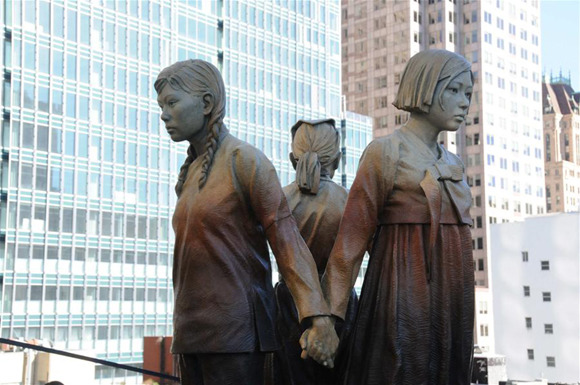
A "comfort women" monument is seen at St. Mary Square in San Francisco, the United States, on Sept. 22, 2017. Comfort Women Justice Coalition, a local grassroots advocacy group devoted to bring justice for the victims of Japanese military sexual slavery during the World War Two, unveiled a monument dedicated to the "comfort women" in San Francisco on Friday. (Xinhua/Ma Dan)
"I hate the crime, not the people," an emotional Yong-Soo Lee, a Korean woman who survived the sexual slavery by the Imperial Army of Japan during World War II (WWII), told a packed audience at a corner of a public square here.
It was not the first time for Lee, aged 89, to make such a statement. She had spoken before in front of local and national legislative bodies as well as national and international human rights committees, and to reporters, about presumably the largest-scale crime specifically targeting women in human history.
At St. Mary's Square Annex in the city on the U.S. West Coast, Lee witnessed the unveiling of a memorial called the "Comfort Women" Column of Strength on Friday. The face of the sculpture depicted Kim Haksoon, a Korean woman forcefully taken at the age of 17 by Japanese soldiers and confined to a "comfort station."
Kim died in December 1997 at the age of 73.
Kim was the first among the surviving "comfort women," a euphemism for the hundreds of thousands of girls and women in 13 Asia-Pacific countries or regions who were forced into sexual slavery by the Japanese army from 1930 to 1954, to go public in front of television cameras about her story in August 1991.
Lee followed in June 1992, telling about her sufferings which started at the age of 16.
It was not the first time for Lee, now an activist, to travel around the world to tell people what it means for her to seek justice, especially for those who did not survive to hear a formal apology from the Japanese government.
Historians believe that as many as 200,000 women, mostly from the Korean Peninsula as well as from China and Southeast Asian nations, were forced into sex enslavement for Japanese soldiers during the devastating war. However, those who deny history in Japan denigrate them as "paid prostitutes" or "willing volunteers."


















































